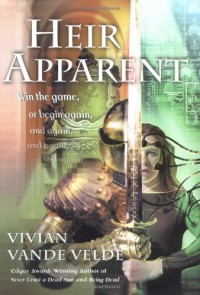Currently reading
The Haunting of Hill House
The Mirror Empire
The Secret History of the Mongol Queens: How the Daughters of Genghis Khan Rescued His Empire (Audio)
Heir Apparent
 This book is an excellent example of how much the YA genre has shifted over the past decade. I read a fair amount of current YA, and while I'm technically old for it, I'm clearly not that far out of the marketing department's sights. Publishers Weekly informs me that today's YA is generally aimed at the sixteen to twenty-five set.
This book is an excellent example of how much the YA genre has shifted over the past decade. I read a fair amount of current YA, and while I'm technically old for it, I'm clearly not that far out of the marketing department's sights. Publishers Weekly informs me that today's YA is generally aimed at the sixteen to twenty-five set.But Heir Apparent was published in 2002, when YA was still aimed firmly at young adults--that is, at kids who hadn't yet left home. Even if I'd found in 2002, when I was still a teenager albeit one a couple years into her college career, I'm pretty sure I would have found it painfully young. The protagonist is fifteen, but if anything I'd say this book is targeted at twelve- or thirteen-year-olds, following the classic "make the protagonist older than the audience" formula of middle-grade fiction.
I will say this for Giannine: unlike the protagonists of many of today's YA novels, she's convincingly teenaged. Unfortunately, at this point I'm far enough removed from teenagerhood that this only makes me sigh and grit my teeth. And yet I kept reading, because the game Giannine plays was genuinely compelling to me. I'm fascinated by game design, and I thought Velde's description of Heir Apparent the game managed to walk the line of telling a compelling story that still seemed believably programmable as a computer game. I was glad we got to see so many forks and wish I could explore others.
Sadly, that plot kept getting interrupted by the frame plot, which mostly just annoyed the hell out of me. It made the unfortunately frequent error of raising the states too high, by which I mean I knew the author was never going to make good on the threat so it provided none of the tension it should have. Specifically, the frame story has Giannine trapped within her game by a terrorist attack that fried the computer, preventing her from being disconnected safely by third parties; if she doesn't win, she'll die. But this is a first-person novel aimed at middle school students. I had exactly zero fear that the protagonist would actually die, and I'm pretty sure I would have felt the same if I'd read it when I was twelve. It doesn't take that much genre savvy to work it out.
It's unfortunate, because I can think of so many better frame stories. Giannine has parent issues out the wazoo; maybe one of her parents could have been an excellent gamer whose reputation she was trying to live up to, or maybe there could have been a cash prize for the game that would have given her the money she needed to finally initiate a visit to one of her parents on her own terms. In either case, there would still have been an external motivation for Giannine to win . . . but there also would have been real tension about whether Giannine would succeed in gaining parental approval/time, or whether she would need to learn how to do without.
And then there's the broader frame story, which is painfully unsubtle. "This book is dedicated with affection for, but no patience with, those who would protect our children through humorless moralizing and paranoia about fantasy," says the dedication, and of course, in the story, it's anti-fantasy protestors who put Giannine's life at risk by damaging the game terminal she's playing on. Of course it is. I honestly find myself wondering if the author realized that her adventure novel made playing fantasy games sound dangerous and swapped ecoterrorists for save-our-children-terrorists at the last second just to make sure the moral aligned with her own beliefs. Minus one star for blunt-force moralizing, and we get a solid two stars. Recommended only for the pre-high school set.






